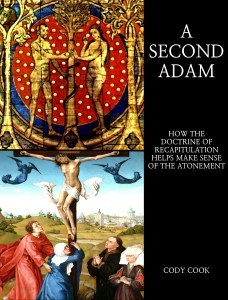Cody Cook's Blog, page 25
November 4, 2017
Cantus Firmus at the Movies Ep. 7 – Crimes and Misdemeanors (w/ Bridget Nelson)
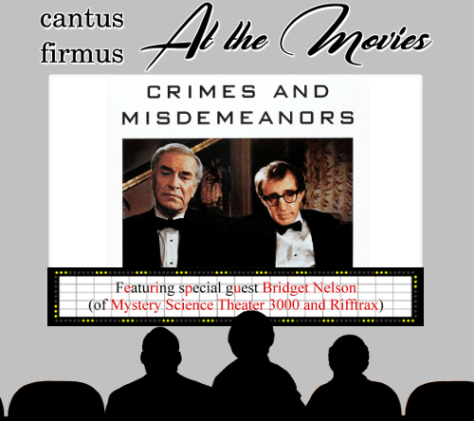
My special guest was Bridget Nelson of Mystery Science Theater 3000 and Rifftrax fame. The film we discussed was Woody Allen’s 1989 Crimes and Misdemeanors, a film that asks difficult questions about morality and integrity in a godless universe.
Bridget can be found at www.rifftrax.com, on Twitter at @bridgetjnelson, and her podcast Instead of Tweeting can be found on iTunes.
Audio:
http://www.cantus-firmus.com/Audio/20171104-CFATM-Ep7-CrimesandMisdemeanors(wBridgetNelson).mp3
Music:
“Octagon Pt 2” by Polyrhythmics. Licensed under CC BY 3.0
http://www.needledrop.co/wp/artists/polyrhythmics/
October 5, 2017
PODCAST: Cantus Firmus Book Club Ep. 2 – Movies Are Prayers (w/ the author Josh Larsen)

I had the opportunity to speak with Josh Larsen about his thought-provoking new book Movies Are Prayers. Josh’s career began in the newspaper business, where he started out as a beat reporter for a weekly community newspaper and went on to become the film critic for the Chicago-based Sun-Times Media for more than 10 years. In 2011, he joined the Christian media landscape as editor of Think Christian, and in 2012 he joined the long-running weekly podcast Filmspotting, aired on WBEZ in Chicago.
Download:
http://www.cantus-firmus.com/Audio/20171005-CFBC-Ep2-MoviesArePrayers(wJoshLarsen).mp3
September 20, 2017
PODCAST: Fight the Powers – What the Bible Says About the Relationship Between Demonic and Political Power

Download:
http://www.cantus-firmus.com/Audio/20170920-FightthePowers.mp3
Notes:
In a recent podcast which I titled “Make Christianity Weak Again,” I talked about the approaches which the church in the United States has used in interacting with the political realm. The place where I landed is that the church should look at the state with suspicion, view its relationship to it as an uneasy one, and not seek to consolidate political power but to emphasize its spiritual power.
In this podcast, I want to give the biblical theory behind my practical application. Why should the church not seek to align itself with the state?
The biblical answer, in short, is that the world is in the hands of demonic forces and God’s kingdom is a spiritual one–not a physical one. In other words, there is a fundamental incompatibility between church and state. It is God’s will that both exist in this age, and both serve a divine purpose, but they are two very different kinds of things. We are called to pray for the peace of the state where we find ourselves and for its leaders–particularly that they would be persuaded to leave us alone–but not to conquer it for Christ.
Deuteronomy 32 provides the most basic outline of the notion that the nations are under the control of demonic forces. Verses 8-9 inform us that, “when the Most High gave to the nations their inheritance, when he divided mankind, he fixed the borders of the peoples according to the number of the sons of God. But the LORD’s portion is his people, Jacob his allotted heritage” (ESV).
The term “sons of God,” in Old Testament usage, refers to angels. In other words, God has placed spiritual forces over nations. The passage goes on to speak about God’s sovereignty to judge Israel and the nations, even those nations whom God’s angels have authority over, so this notion is not a challenge to God’s sovereignty.
Elsewhere in the Old Testament, we have more explicit testimony that the angels placed over the nations are corrupted beings which mislead the people under their authority. For instance, in Psalm 82. Asaph describes the scene. It is one of judgment over these corrupted angels:
“God has taken his place in the divine council; in the midst of the gods he holds judgment: ‘How long will you judge unjustly and show partiality to the wicked? . . . You are gods, sons of the Most High, all of you; nevertheless, like men you shall die, and fall like any prince.’ Arise, O God, judge the earth; for you shall inherit all the nations” (Ps. 82:1-8 ESV)!
The picture painted for us by scripture so far is of many nations with fallen angelic forces over them. This picture is confirmed in Daniel 10 where an angelic messenger claims to have been held back from reaching Daniel by a contrary angelic figure described as “the prince of the kingdom of Persia”:
“The prince of the kingdom of Persia withstood me twenty-one days, but Michael, one of the chief princes, came to help me, for I was left there with the kings of Persia, and came to make you understand what is to happen to your people in the latter days. For the vision is for days yet to come” (Dan. 10:13-14 ESV)
These themes continue between the time of the Old Testament writings and the time of Jesus. Walter Wink, in the first volume of his book series Naming the Powers, gives a few examples.
“In 3 Enoch, where Sammael, or Satan, is described as the angel of Rome and the head of the seventy princes of the kingdoms of the world. Even here, however, Satan and the angels of the nations remain members in good standing in the heavenly court: “Every day Satan is sitting, together with Sammael, the Prince of Rome, and with Dubbiel, the Prince of Persia, and they write the iniquities of Israel on writing tablets which they hand over to the Seraphim, in order that they may present them before the Holy One, blessed be He, so that He may destroy Israel from the world,” that is, so that they might be permitted, as the rod of God’s judgment, to let their nations devour Israel. But the Seraphim, true to their name, burn (saraph) the accusations before they can reach God’s throne (3 Enoch 26:12)”
“Another thread from I Enoch 89-90 leads to the full identification of the seventy shepherds with the seventy angels of the seventy nations. This identification may have already been intended by I Enoch, since the idea of seventy nations was as old as Genesis 10. The Hebrew Testament of Naphtali 8, whose antiquity has now been confirmed by the discovery of fragments at Qumran, tells of the time when “the Lord … came down from His highest heavens, and brought down with Him seventy ministering angels, Michael at their head. He commanded them to teach the seventy families which sprang from the loins of Noah seventy languages.””
The New Testament confirms the notion of demonic control of the nations in the strongest possible terms. In Luke 4:5-7, Satan himself claims to have been given authority over nations and states with the additional detail that he, the devil, gives it to whomever he pleases. Jesus does not dispute his assertion. Indeed, he affirms it in John 12:31, 14:30, and 16:11 where He calls Satan “the ruler of this world.” John affirms this view as well in 1 John 5:19 with his claim that the *whole world* lies under the power of the evil one, as well as in Revelation 13:7 where he tells us that Satan has authority over every tribe, people, language, and nation.
Accepting that political power is under the authority of Satan, how are we encouraged to react to it? Are we to seek to conquer it for Christ, as Dominionists and Theonomists argue? Not according to Jesus, who in John 18:36 told Pilate:
“My kingdom is not of this world. If it were, my servants would fight to prevent my arrest by the Jewish leaders. But now my kingdom is from another place.”
Paul also affirms our thesis in Ephesians 6:12 where he informs his Christian readers that, “we do not wrestle against flesh and blood, but against the rulers, against the authorities, against the cosmic powers over this present darkness, against the spiritual forces of evil in the heavenly places” (Eph. 6:12 ESV).
But what did Paul mean when he said we wrestled against rulers and authorities? This combination of words, rulers (arche) and authorities (exousia) are used together a handful of times in the NT:
Of political powers:
Luke 12:11
Luke 20:20
Titus 3:1
Of negative spiritual powers:
Eph 3:10– in order that the manifold wisdom of God might now be made known through the church to the rulers and the authorities in the heavenly places.
Possibly both:
1 Cor 15:24– then comes the end, when He delivers up the kingdom to the God and Father, when He has abolished all rule and all authority and power.
Eph 1:21– He raised Him from the dead, and seated Him at His right hand in the heavenly places, far above all rule and authority and power and dominion, and every name that is named, not only in this age, but also in the one to come.
Eph 6:12– For we wrestle not against flesh and blood, but against principalities, against powers, against the rulers of the darkness of this world, against spiritual wickedness in high places.
Col 1:16– all things were created by Him.
Col 2:10– Christ is the head of all arche and exousia.
Col 2:15– When He had disarmed the rulers and authorities, He made a public display of them, having triumphed over them through Him.
When Paul writes that God, “disarmed the rulers and authorities and put them to open shame, by triumphing over them” (Col. 2:15 ESV), we must understand that he probably included both physical kingdoms and their spiritual authorities. However, he viewed our battle against political powers not as a military one but a spiritual one since governments are under the authority of demons.
Romans 12-13 elaborates on the idea of fighting spiritual, not physical battles. Though Paul argues that magistrates serve a God-ordained purpose in their use of physical punishment, Christians operate at a different frequency:
“Beloved, never avenge yourselves, but leave it to the wrath of God, for it is written, ‘Vengeance is mine, I will repay, says the Lord.’ . . . Do not be overcome by evil, but overcome evil with good” (Rom. 12:19-21 ESV).
It is worth noting that Paul is here quoting Deuteronomy 32:35, the passage I cited earlier which gives us the first glimpse at the angelic power over the nations. In context, God is speaking about punishing the nations for their wickedness. They may be under a different “god,” (so to speak) but the God of Abraham, Isaac, and Jacob is supreme over all and will judge both angels and men.
Recall that in Deuteronomy 32, God described Israel as His “portion” in a way that the nations, under demonic authority, were not. Similarly, the church is not under the authority of demons, but of Christ alone. We may be encouraged by Paul to, “pray for rulers and for all who have authority so that we can have quiet and peaceful lives full of worship and respect for God,” but we are not encouraged to think of ourselves as a people living under two kingdoms. We are guests in a kingdom held by demons, and we should conduct ourselves as respectful guests, but we are also ambassadors of a different kingdom. It will not do to have us declaring allegiance to a kingdom which is opposed to the one we are claiming to represent, particularly when the kingdom of God will smash the kingdoms of men (Daniel 7), God will punish corrupted powers in the heavens as well as rulers on earth (Isaiah 24:21), and since even now Christ’s cross has disarmed the powers (Col 2:15).
What then should our attitude toward the state be? As the 2nd century bishop and martyr Ignatius of Antioch wrote in his epistle to the Romans:
“All the ends of the earth, all the kingdoms of the world would be of no profit to me; so far as I am concerned, to die in Jesus Christ is better than to be monarch of earth’s widest bounds. He who died for us is all that I seek; He who rose again for us is my whole desire.”
August 26, 2017
PODCAST: Cantus Firmus at the Movies Ep. 6 – The Shack and Silence (w/ Lenny Esposito)

In this episode my special guest Lenny Esposito and I talk about two movies made in the last year that deal with issues of God and the problem of evil and suffering–The Shack and Silence. We had a great discussion where we analyzed the underlying theologies of these films and the problem with “Christian movies.”
Author and speaker Lenny Esposito has been spreading convincing Christianity across the globe by stirring the hearts and minds of the lost and the church for twenty years. A pioneer in online apologetics with his popular www.ComeReason.org web site and podcast, Lenny has also contributed to books such as the award-winning Apologetics Study Bible for Students (B&H, 2010), A New Kind of Apologist (Harvest House, 2016), and True Reason: Confronting the Irrationality of the New Atheism (Kregel, 2014). His articles have appeared in the Los Angeles Times and the Southern California Christian Times.
Audio:
http://www.cantus-firmus.com/Audio/20170826-CFATM-Ep6-SilenceandTheShack(wLennyEsposito).mp3
Music:
“Octagon Pt 2” by Polyrhythmics. Licensed under CC BY 3.0
http://www.needledrop.co/wp/artists/polyrhythmics/
July 7, 2017
PODCAST: Jesus-Centric vs. Flat Bible: a Conversation with Keith Giles

Keith Giles, author of Jesus Untangled: Crucifying Our Politics to Pledge Allegiance to the Lamb, was my guest to discuss two approaches that he sees commonly applied to reading scripture–a Jesus-Centric approach (where the words of Jesus are the standard) and a Flat Bible approach (where all scripture is equally authoritative and applicable for Christians). We had a great conversation with lots of friendly disagreement.
Podcast link:
http://www.cantus-firmus.com/Audio/20170707-JesusCentricwKeithGiles.mp3
Music:
“The Itis” by Polyrhythmics. Licensed under CC BY 3.0
http://www.needledrop.co/wp/artists/polyrhythmics/
July 3, 2017
PODCAST: Cantus Firmus Book Club Ep. 1 – Jonathan Haidt’s The Righteous Mind (w/ Tim the Atheist)
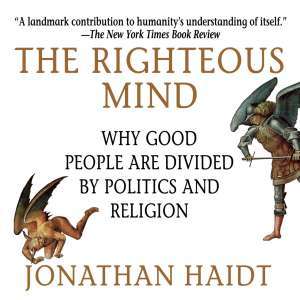
My guest “Tim the Atheist” and I discussed Jonathan Haidt’s The Righteous Mind: Why Good People Are Divided By Politics and Religion. The topics discussed ranged from sociobiology to polarization to psychopaths to atheistic versus Christian conceptions of morality. A very fun and thoughtful episode!
Audio:
http://www.cantus-firmus.com/Audio/20170703-CFBC-Ep1-TheRighteousMind(wTimTheAtheist).mp3
Music:
“Liam Rides a Pony” by Polyrhythmics. Licensed under CC BY 3.0
http://www.needledrop.co/wp/artists/polyrhythmics/
July 1, 2017
Kindle Giveaway of my book A Second Adam!
Enter for a chance to win a copy of my book A Second Adam on Kindle! Link below:
https://giveaway.amazon.com/p/66c54188007dde3a#ts-dei
June 16, 2017
PODCAST: Cantus Firmus at the Movies Ep. 5 – Batman V Superman (w/ Ben Doublett and Jackson Ferrell)
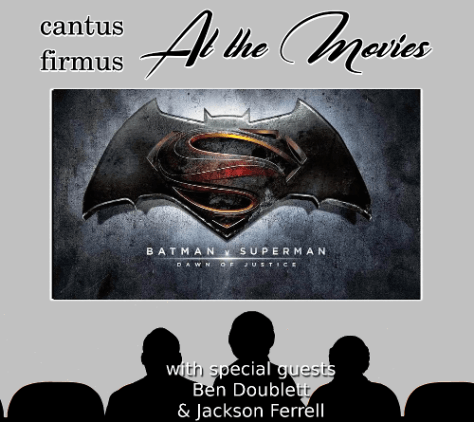
“The greatest gladiator match in the history of the world–
God versus man.”
In this episode I and special guests Ben Doublett and Jackson Ferrell watched Zack Snyder’s Batman V Superman: Dawn of Justice (2016) and talked about its examination of the problem of evil and how it portrays a Christian answer to the problem by way of Superman’s identification with humanity. We also discussed the idea of one’s view of God being shaped by their relationship with their father, as portrayed in the film. Because Ben is an atheist influenced by the egoistic moral philosophy of Ayn Rand, we also had some excellent discussion of egoism and altruism (and which of the heroes represented which view). A very philosophical episode!
Ben Doublett’s recent novella, Kung Fu Gladiator, can be found on Amazon. Jackson Ferrell’s blog, Chocolate Book, can be found at www.chocolatebook.net
Music:
“Octagon Pt 2” by Polyrhythmics. Licensed under CC BY 3.0
http://www.needledrop.co/wp/artists/polyrhythmics/
June 12, 2017
PODCAST: Senator Sanders and the Religious Litmus Test – Should Christians Be Excluded from Public Office?

A few comments in regard to Senator Bernie Sanders’ comments about whether a Christian who believes in salvation in Christ alone should serve in political office.
Podcast link:
http://www.cantus-firmus.com/Audio/20170612-SenSandersandtheReligiousLitmusTest.mp3
Notes:
I try not to talk too much about political events on this podcast, in part because I’d like it to stay relevant for future listeners and in part because I don’t want my own private passions to lead me to tie my faith too closely with my political opinions with the result that I discourage or mislead my listeners.
I did, however, post a short episode a number of months back where I challenged, both as a Christian and as an American, Republican and White House Press Secretary Sean Spicer’s comments to a heckler about immigration.
Again as a Christian and as an American, I’m challenging the recent comments of Senator Bernie Sanders, the sometimes Democrat/sometimes independent, self-identified Democratic Socialist. In an exchange with Russell Vought, President Trump’s nominee for Deputy Director of the White House Office of Management and Budget, Sanders made some very controversial statements about the religious beliefs of Vought seemingly disqualifying him from public office. Here’s the exchange:
Sanders: Let me get to this issue that has bothered me and bothered many other people. And that is in the piece that I referred to that you wrote for the publication called Resurgent. You wrote, “Muslims do not simply have a deficient theology. They do not know God because they have rejected Jesus Christ, His Son, and they stand condemned.” Do you believe that that statement is Islamophobic?
Vought: Absolutely not, Senator. I’m a Christian, and I believe in a Christian set of principles based on my faith. That post, as I stated in the questionnaire to this committee, was to defend my alma mater, Wheaton College, a Christian school that has a statement of faith that includes the centrality of Jesus Christ for salvation, and . . .
Sanders: I apologize. Forgive me, we just don’t have a lot of time. Do you believe people in the Muslim religion stand condemned? Is that your view?
Vought: Again, Senator, I’m a Christian, and I wrote that piece in accordance with the statement of faith at Wheaton College:
Sanders: I understand that. I don’t know how many Muslims there are in America. Maybe a couple million. Are you suggesting that all those people stand condemned? What about Jews? Do they stand condemned too?
Vought: Senator, I’m a Christian . . .
Sanders (shouting): I understand you are a Christian, but this country are made of people who are not just — I understand that Christianity is the majority religion, but there are other people of different religions in this country and around the world. In your judgment, do you think that people who are not Christians are going to be condemned?
Vought: Thank you for probing on that question. As a Christian, I believe that all individuals are made in the image of God and are worthy of dignity and respect regardless of their religious beliefs. I believe that as a Christian that’s how I should treat all individuals . . .
Sanders: You think your statement that you put into that publication, they do not know God because they rejected Jesus Christ, His Son, and they stand condemned, do you think that’s respectful of other religions?
Vought: Senator, I wrote a post based on being a Christian and attending a Christian school that has a statement of faith that speaks clearly in regard to the centrality of Jesus Christ in salvation.
Sanders: I would simply say, Mr. Chairman, that this nominee is really not someone who this country is supposed to be about.
There are two separate messes to untangle here. The first has to do with Sanders’ seeming ignorance of history and religion and the second has to do with him creating a religious test for public office.
As for Sanders’ seeming ignorance, upon what basis does he argue that those holding that only their religious faith can guarantee salvation are not “who this country is supposed to be about?” Many of the founding fathers were Christians who believed this very thing. Should they be wiped from our nation’s history? Is Sanders unaware of their beliefs, or is he arguing for a radical revolution in American politics which excludes those holding to traditional religious views from public office?
Sanders himself expressed concern about Islamophobia, yet most Muslims, even the many who believe in peaceful co-existence with other religious faiths, would likewise argue that Islam is the path to salvation to the exclusion of other religious traditions. This idea is consistent with the Qur’an itself which tells us in 3:85 that:
“And whoever desires other than Islam as religion – never will it be accepted from him, and he, in the Hereafter, will be among the losers.”
Should conservative but patriotic Muslims therefore be excluded from public office? If Sanders is consistent, he would have to say yes. But this would certainly be an example of the “Islamophobia” that he seems so concerned about.
Sanders needs to understand that religions are exclusivistic. They tend to say, “this is the way, and other ways are not the right way.” There are Muslims and Christians who would nuance this claim, arguing that someone who loves God but has been mislead into following a wrong path might still attain salvation by God’s grace. But even the most exclusivist Christians and Muslims are capable of serving a people composed of many different beliefs and backgrounds. My projection of your eternal destiny doesn’t need to stop me from serving or loving you now, after all.
Now to the second issue–the religious litmus test. Those who have listened to my podcast before know that I have mixed feelings about how Christians often choose to get involved in politics. But let’s set that aside for a moment.
America is a country that has enshrined freedom of religion into its founding documents. If we are to be true to this principle, we cannot exclude anyone from public office on the basis of his or her views about salvation or the afterlife if they are capable of serving everyone regardless of their religious beliefs. A Christian or Muslim may serve the people of different religions even if he or she disagrees with them. Someone espousing what Sanders is–that those who are religious should not be accepted into public office or that many of his religious constituents are not what America “is supposed to be about”–cannot.
What Sanders is saying is not only radicalism, but bigotry. It’s bigotry when Donald Trump claims that he wants to stop Muslims from entering our country and its bigotry when Bernie Sanders says Christians should not hold public office.
Someone that bigoted or that ignorant representing his constituents in public office is, frankly, “not someone who this country is supposed to be about.” America should be about true tolerance, not religious or anti-religious authoritarianism.
I’m not one of those Christians who tends to claim that the sky is falling any time we don’t come out on top in relation to some social or political issue. I also think that a lot of the distrust that many have for the church is to a large extent our fault.
At the same time, we ought to want to live in a country where we are not blocked from participating, nor should we desire to block others from contributing or serving in the political sphere. What Senator Sanders said here is very troubling to me, and what’s more troubling is that his sentiments are not only his own. He speaks for many secular-minded individuals who think religious people shouldn’t be allowed to participate in politics or the public square.
If we don’t look for ways to unite around shared goals and values, our ever-widening divisions will tear us apart as a people. Senator Sanders comments give us a preview of what that might look like.
May 27, 2017
PODCAST: Cantus Firmus At the Movies Ep. 4 – The Mission (w/ Keith Giles)
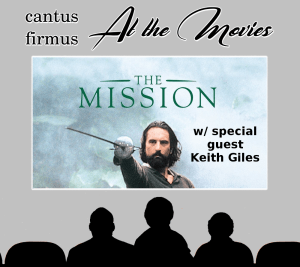
In this episode we talked about the 1986 film The Mission, and particularly dissected its themes of love, forgiveness, violence, and the corrupting entanglement of church and state. Audio can be downloaded below or found on iTunes if you search “Cantus Firmus.”
Keith Giles was my special guest and can be found at www.KeithGiles.com. His new book, Jesus Untangled: Crucifying Our Politics to Pledge Allegiance to the Lamb can be purchased on Amazon. Audio can be downloaded below or found on iTunes by searching “Cantus Firmus.”
Audio:
http://www.cantus-firmus.com/Audio/20170527-CFATM-Ep4-TheMission(wKeithGiles).mp3
Music:
“Octagon Pt 2” by Polyrhythmics. Licensed under CC BY 3.0
http://www.needledrop.co/wp/artists/polyrhythmics/

